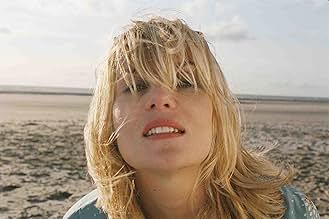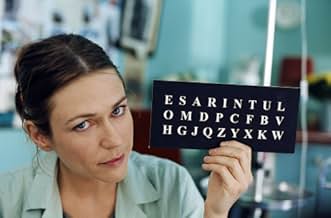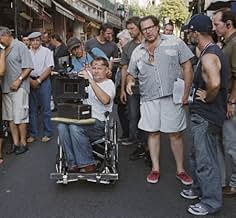L'histoire vraie de Jean-Dominique Bauby, rédacteur en chef du magazine Elle, victime d'un accident vasculaire cérébral et forcé de vivre avec un corps presque totalement paralysé ; seul son... Tout lireL'histoire vraie de Jean-Dominique Bauby, rédacteur en chef du magazine Elle, victime d'un accident vasculaire cérébral et forcé de vivre avec un corps presque totalement paralysé ; seul son oeil gauche est resté en activité.L'histoire vraie de Jean-Dominique Bauby, rédacteur en chef du magazine Elle, victime d'un accident vasculaire cérébral et forcé de vivre avec un corps presque totalement paralysé ; seul son oeil gauche est resté en activité.
- Réalisation
- Scénario
- Casting principal
- Nommé pour 4 Oscars
- 68 victoires et 107 nominations au total
Avis à la une
Beautifully shot by cinematographer Janusz Kaminski with a screenplay by Ronald Harwood, the film begins with Bauby's confused awakening in the hospital after twenty days in a coma. We see only a blur of images and claustrophobic close-ups that mirror the patient's mental state. We can make out a hospital room and doctors and nurses offering reassuring thoughts. We hear Bauby's words but the doctors do not and we know that while his body isn't functioning, his mind is as sharp as ever. With the help of a speech therapist (Marie-Josée Croze), and a very patient transcriber, a code is developed that allows Bauby (Mathieu Amalric), called Jean-Do by his friends and family, to compose a book based on his experience.
When the therapist recites the most-frequently used letters in the French alphabet, Bauby blinks when he wants to choose a letter. The book, on which the film is based, was published in 1997, shortly after Bauby's death. One of the most dramatic moments in the film occurs near the beginning when the first thought Jean-Do communicates is that he wants to die. Feeling rejected and angry, the therapist stomps out of the room but apologizes and comes back shortly to resume the treatment. We do not actually see Jean-Do until about a third of the way through the film but we can hear his thoughts which are in turn angry, funny, and bitterly ironic. Bauby compares his body to a deep-sea diver being suffocated in a diving suit and his poetic imagination to a butterfly.
It is Jean-Do's sense of humor that keeps the film as light as it can be under the circumstances and his eloquence that keeps us riveted. When we finally do see him with his immobile body and his drooping lower lip, it is still a shock but we smile when he says that "I look like I came out of a vat of formaldehyde." Much of the film vividly explores the editor's imagination and the camera takes us on some wild rides that include images of Nijinsky, Empress Eugénie, Marlon Brando, and Jean-Do in his imagination skiing and surfing. Some of the most emotional moments occur when he greets his young children at the beach for the first time after his stroke, a telephone "conversation" with his 92-year old father (Max Von Sydow), and flashbacks to his youth - driving with his girlfriend, shaving his father, supervising a fashion shoot, and taking his son on a trip in a new sports car. Bauby's wife Céline (Emmanuelle Seigner), whom he left for exotic girlfriend Ines (Agathe de La Fontaine), visits him in the hospital and comforts him while Ines cannot bring herself to see him, saying that she wants to remember him the way he was.
Realizing how his life had been less than exemplary, his stroke becomes an opportunity for redemption and allows him, if not to cleanse his soul, to discover that humanity lies in his consciousness not in material things or sexuality. The Diving Bell and the Butterfly is a film of enormous power that shakes us and enables us to get in touch with the miracle of each moment. Schnabel says that his purpose in making the film was to tell "the story of all of us, who surely do face death and sickness. But if we look", he says, "we can find meaning and beauty here." There is enough of both meaning and beauty to make The Diving Bell and the Butterfly one of the best films of the year.
The film deals with a rare physical condition, and I was physically there with the character from start to finish. I felt each moment as if it were my own. That is a rare accomplishment in cinema. Julian Schnabel directed a stellar cast. Mathieu Amalric was unusually charming as Jean-Dominique Bauby, and Max Von Sydow was heartbreaking as his lonely widower father. The female leads were all equally impressive as they were beautiful. I don not mean to generalize them, but they were all so excellent that they blend seamlessly in my mind, in terms of performance.
Overall, this film was as pure a cinematic experience as I've witnessed in a long time. A true artist turns out a film that is truly a piece of art. Julian Schnabel takes his time in between films, but with work like this, there's no need to rush. Like a good painting, one can enjoy it for a lifetime.
The first movie I saw by neo-expressionist painter Julian Schnabel was Before Night Falls. In that film, the artist was trapped in prison, quite literally. Which presented great communication difficulties for him (in giving life to his novel in the world). In this film, we have examples of people trapped or imprisoned in different ways. A man who had been taken hostage in Beirut. An ailing father who has difficulty climbing stairs to and from his apartment. Both are trying to reach out to the main protagonist. Bauby. An amazing and successful socialite who's in his very own 'prison.' Bauby has secured a publishing contract when tragedy hits. A stroke causes 'locked in' syndrome and he reviews his options as an author. The book he writes, and on which this film is based, is the one he is remembered for. I haven't read it. But his powers of expression, glimpsed in the film, make me want to buy it. The book he nearly wrote - a re-write of the Count of Monte Cristo - would probably be pulped. (But I wonder if that was poetic embellishment - Dumas was the first person to describe locked in syndrome in the person of Monsieur Noirtier de Villeforte, a Cristo character).
How many people know of Jean-Dominique Bauby, former editor of Elle fashion magazine? It doesn't matter. But what does matter is experiencing his ability to discern, his articulate vision of beauty. Not as science, but as an education of the senses (and this is a sensuous and evocative film).
Why is The Diving Bell and the Butterfly so successful? A French language film picking up four Oscar nominations is remarkable. (The American director insisted on authenticity and made it in France and in French.) I suspect the consummate vocabulary of metaphor it uses is partly responsible. It makes the challenge facing Bauby a global one and relevant to everyone's life. None of us communicates perfectly, after all. Words left unsaid, to friends, to lovers, because we didn't find the 'right' words.
The speech therapist who breaks through Bauby's barrier is excellent. Her motivation is, here is a man she respects and admires. It is also the biggest challenge of her career. Bauby's sense of humour, voiced as interior dialogue, is scathing. His lecherous thoughts about the therapist are tempered with good taste and his incorrect jokes about his own condition.
Bauby starts to write his novel and his sense of poetry bursts through. We feel a glimmer of a mental rush associated with artists, explorers and adventurers. The Diving Bell and the Butterfly is the adventure of life and death. Not in Hollywood terms with big explosions. But with sensitivities, with meanings. It has a 'reach out and touch' quality. A Laughing Buddha whose joke we've missed (but might catch on another occasion). It is the most awesomely beautiful film I have seen for a long while.
Schnabel's thing might be helping us taste something we might otherwise let go unnoticed. In Basquiat, he introduced many people to the artist Basquiat, but also to the revered and misunderstood Warhol. (And if you want to understand someone as weird as Warhol, understanding the contemporaneous and only slightly weird - Basquiat is maybe a good place to start.) Here, his insight is transcendent. The film is a work of art. About a work of art. The use of visual metaphor and an excellent script lets us use Bauby's condition symbolically. Ingenious editing keeps us on the edge of our seat, especially towards the resolution, as we race to work out how a drive in the countryside will end.
The only scene I could find a flaw in was where he shaves his father. The sound of the rasping blade as he shaved his dad troubled me if it was added afterwards I think it was overdone and distracting. But the scene was an emotional building block. And much of our story is told like this, through flashbacks. With his beautiful ex-wife. With his children. With his lover. And with his father. People with whom, like most of us, he still has one or two little unresolved issues. They made me wonder if we make too little effort to communicate when it seems easy to do so.
The film successfully mixes a down-to-earth style, great special effects to see through Bauby's one remaining eye, and jaw-dropping montage. As we observe mundane details of our hero's life falling apart or reaching fulfilment, the camera cuts to ice fields collapsing into the sea or winding back in reverse motion. Or there will be a sudden switch to sensuality as he guzzles wine and oysters in a swank restaurant, feeding and being fed by his lover. Janusz Kaminski, the cinematographer for countless Steven Spielberg's, excels, as does Oscar-winning screenwriter Ronald Harwood.
It should perhaps be noted that the film has not been immune to attempted high-jacks by groups with their own agendas. The Catholic News Service hailed its 'life-affirming qualities' compared to another great film it denigrates, The Sea Inside. Although locked-in state is a rare condition, few individuals experiencing it are likely to have the wealth and resources, public acclaim and reason to live that Bauby had. The situation of Ramon Sanpedro (The Sea Inside) might be a more common one.
The Diving Bell and the Butterfly is about Jean-Dominique Bauby, (Mathieu Amalric) a popular editor of the French fashion magazine 'Elle.' At age 43 he is stricken with a stroke leaving him with lock-in syndrome, a medical condition that, except for his left eye, rendered him completely immobile. In fear of his right eye becoming "septic" doctors quickly stitched the eye shut.
This sealing of that eye is an early scene, which is so perfectly shot that it places you inside Bauby's head and body, and keeps you there for the entire film. You see the world as he views it while desiring to be free of the paralyzing feeling of a sinking diving bell. At other times, with his imagination, you find yourself fluttering as free as a butterfly.
Bauby wrote his story with the use of a unique sequence of letters specifically designed so he could blink his eye to communicate as he created every single word of his story.
This film is in no way depressing. The cinematography is brilliantly captured. Everyone was completely captivated by the screenplay as we experienced life deep inside Bauby's body, mind and soul. For the entire 2+ hours, you won't want to be anyplace else.
Le saviez-vous
- AnecdotesTo familiarize himself with Bauby's sheltered existence, director Julian Schnabel made the movie in the same hospital where Bauby was treated, meeting many of the orderlies who had treated him. He also shot scenes on the same balcony where Bauby relaxed, and on the same nearby beach to which his family had taken him.
- GaffesWhen Jean-Dominique goes on a boat ride, a 'Speedferries' vessel can be seen in the background. Speedferries started business in 2004, years after the movie was set.
- Citations
Jean-Dominique Bauby: I decided to stop pitying myself. Other than my eye, two things aren't paralyzed, my imagination and my memory.
- Bandes originalesTheme for The Diving-Bell and the Butterfly
Composed by Paul Cantelon
Studio recording The University of Victoria
Engineer / Producer Russell Dawkin
Meilleurs choix
Détails
- Date de sortie
- Pays d’origine
- Site officiel
- Langue
- Aussi connu sous le nom de
- El llanto de la mariposa
- Lieux de tournage
- Sociétés de production
- Voir plus de crédits d'entreprise sur IMDbPro
Box-office
- Montant brut aux États-Unis et au Canada
- 6 003 227 $US
- Week-end de sortie aux États-Unis et au Canada
- 75 721 $US
- 2 déc. 2007
- Montant brut mondial
- 19 780 116 $US
- Durée1 heure 52 minutes
- Couleur
- Mixage
- Rapport de forme
- 1.85 : 1








































